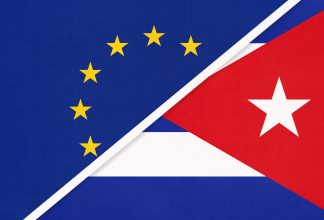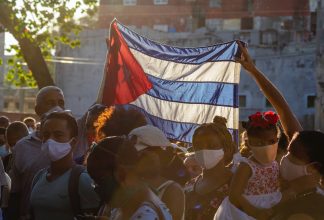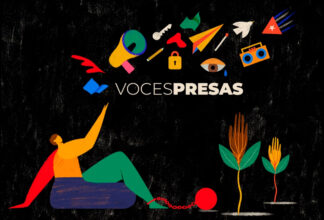Cuban Government Adopts New Laws to Track Down Democracy Advocates on the Internet

On 17 August, the Cuban government adopted a legal framework for telecommunications, information and communication technologies, officially to protect Cuba against the country’s historical enemies. In reality, it violates several human rights standards by giving the authorities new tools to track down and oppress citizens who use the internet to mobilize for democratic change. In a joint statement, we urge the European Union to put pressure on the Cuban government to reform the legal framework according to human rights standards.
Read the full statement below.
The measures lead by Law Decree 35, and other norms announced by the Cuban government on 17 August are yet to become another tool for violating freedom of speech and the criminalization of democracy activists. They also violate the principles of the Political Dialogue and Cooperation Agreement between the EU and Cuba.
The legislative package has raised several voices of concern from local and international human rights organizations and regional human rights bodies such as the OAS Special Rapporteur on Freedom of Expression.
The Law Decree was adopted under the premise of “establishing a general legal framework for telecommunications, information, and communication technologies, following the universal practice and international conventions.” However, it fails to deliver its promises violating several human rights standards.
Predating from April, the official media has stated that this complementary framework was designed to protect the revolutions against the interest of the country’s historical enemies. It provides the Cuban government new tools to track down and oppress citizens who use the internet to mobilize for democratic change, like the massive protests in July.
The State Council enacted the legislative package in the height of a strong persecution campaign against human rights defenders and political opponents to the government. Human rights watchdog Cubalex has identified more than 911 people that were detained during the protests.
It is also essential to highlight that the Cuban Constitution in its article 4 enables citizens to use all “available means, including armed violence, to fight anyone against the socialist political order,” thus framing anyone who seeks democratic reform as an enemy of the State.
Moreover, the new bills complement a series of legislative measures, such as Law Decrees 370/2018 and 360/2018, which have been used as tools for repression and criminalization of political dissidents along with the penal code.
These new complementary measures are carefully redacted to omit, in its discourse, any terminology that could be seen, at first sight, as problematic. However, considering the context, there are several points of concern:
The first item of concern is that, right from the beginning, the Law Decree states how “telecommunications services are an instrument for the defence of the revolution.” International Human Rights standards establish that any restriction to freedom of expression should exclude the interest of a “government, regime, or power group.”
In addition, the new measures complement sanctions described in Law Decree 370, aimed to punish in a disproportionate way any conduct considered to pose a threat to vague categories such as “fake news,” “national security,” or “public interest.” The Special Rapporteur on the promotion and protection of the right to freedom of opinion and expression raised her concern over China’s 2015 cybersecurity law that has the same definitions, stating that these are broad categories that give officials excessive discretion to determine their meaning.
Furthermore, the new legislation elevates the diffusion of fake news or messages that attempt against the country’s reputation as security threats as serious as child pornography, failing to comply with proportionality requirements established by human rights standards.
Decree 42, also included in the legislative package, imposes restrictions for using communicational protocols and encryption methods that could impede telecommunications technologies such as VPNs. Human rights defenders across the island use VPNs to access independent news, express their thoughts, and access internet pages blocked by the Cuban State.
Consequentially, the legislative measures increase the Ministry of the Revolutionary Forces and the Communications Ministry’s control over telecommunication and information systems and technologies. It also establishes a whistleblower policy for service providers that poses an additional threat to people’s privacy, along with a new administrative plan of action in case of the detection of security threats.
In conclusion, the new legislative package fails to deliver its promises of establishing a legal framework according to international standards; furthermore, several of the announced measures pose a threat to the right to freedom of expression and constitute an additional tool for a campaign of persecution against human rights defenders.
Thereby, Law Decree 35 contradicts the principles in the Political Dialogue and Cooperation Agreement, PDCA, signed by the EU and Cuba in December 2016, which states that:
“Respect for and the promotion of democratic principles, respect for all human rights and fundamental freedoms as laid down in the Universal Declaration of Human Rights and in the core international human rights instruments and their optional protocols which apply to the Parties, and respect for the rule of law constitute an essential element of this Agreement.”
Law Decree 35 also adds to an already long list of legal initiatives adopted by the Cuban government and the Cuban national assembly after the PDCA was signed. These legal initiatives violate the human rights principles laid down in the PDCA in spirit as well as in their details:
- Law Decree 349 of 2018 “Violations of the Regulations on Cultural Policy and the Provision of Artistic Services.”
- Law Decree 370 of 2018 “On the computerization of Cuban society.”
- Constitution of the Republic, of 2019.
- Law 127 of 2019, “Election law.”
In consequence with the arguments above, we urge the EU and its member states to:
- Submit information to the Joint Council established by the PDCA on how Cuba’s current legislation fails to comply with Articles 1:5 of the said agreement, Article 19 of the Universal Declaration of Human Rights; Article 19 of the International Covenant on Civil and Political Rights; Article 4 of the American Human Rights Declarations; and the Joint Declaration on Freedom of Expression And “Fake News,” Disinformation and Propaganda, among other international human rights standards.
- Urge the Cuban State to reform the framework for telecommunications, information, and communication technologies according to international human rights standards.
- Engage in communications with UN special procedures such as the Human Rights Council or the Special Rapporteur on the promotion and protection of the right to freedom of opinion and expression, to urge Cuba to modify its legislation following international human rights standards and to stop using telecommunications and information laws to restrict the right to freedom of speech.
- Use Article 22 in the PDCA to address Law Decree 35, as well as the other legal initiatives listed above, in their human rights dialogues with the Cuban government, and publicly point out what parts are problematic from the human rights principles described as an essential element of the PDCA.
- Initiate cooperation with Cuban human rights groups to monitor the consequences of these legal initiatives on the island from a human rights perspective.


